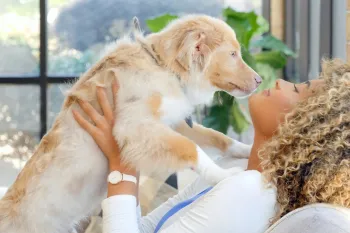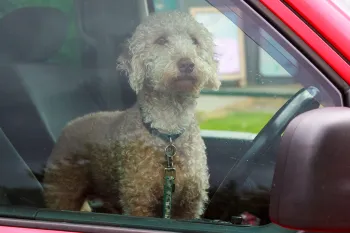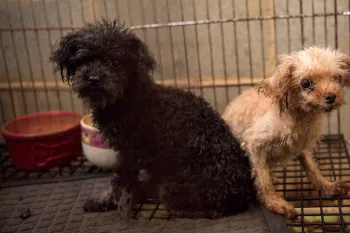Many common household items you use every day can pose serious health risks to pets — often without you realizing it. From garage chemicals to kitchen cleaners, foods, plants, and even everyday objects like coins or cords can be toxic or dangerous if ingested or chewed.
This short guide will walk you through some of the most common hazards found in homes and yards, explain why they’re harmful, and give practical tips to help you pet-proof your space and keep your animal companions safe.
Garage and yard items
Many common substances found in garages and/or used in the yard can cause problems ranging from mild gastrointestinal (GI) upset to more complicated and potentially fatal issues such as respiratory distress or organ failure.
- Antifreeze/coolant (ethylene glycol): Possesses a sweet taste, which can attract pets. Ingesting ethylene glycol can cause rapid kidney failure.
- Insecticides: Many have an application dry time which renders the product safe only once dry. However, coming into contact with active insecticides can be an irritant to pets, and ingestion can be poisonous and/or fatal. Some rodent poisons can cause internal bleeding, seizures and significant kidney problems.
- Lawn fertilizers: Ingestion can cause gastrointestinal issues.
- Mothballs: Contain chemicals which can be harmful when inhaled, absorbed through the skin or ingested. They can cause vomiting, weakness, difficulty breathing, and seizures as well as kidney and liver failure.
- Mushrooms: Certain varieties are safe; however, others are extremely dangerous and can cause GI issues, seizures and significant kidney and liver problems.
- Paints: Can cause severe skin irritation or chemical burns.
- Plants: Lilies, azaleas, tulip bulbs and many other plants can sicken your pet if ingested. View the list of commonly poisonous plants for a comprehensive overview of toxic plants.
- Windshield washer fluid (methanol): Made with a clear, colorless and somewhat sweet-smelling alcohol which can attract pets. Ingestion can cause neurological issues, hypoglycemia and GI upset.
Kitchen items
In addition to our list of plants and foods that can be poisonous to pets, cleaning products you may use in your home can pose significant health risks to animals if the instructions aren’t properly followed or if they are consumed by pets. Be sure to keep all cleaning products clearly labeled and out of reach of pets.
- Cleaning products, such as bleach, drain cleaners, oven cleaners and dishwashing chemicals can cause skin irritation, chemical burns and GI issues if ingested.
- Food: Some foods are toxic to pets in any amount, and others—which may be safe in moderation—can also cause severe harm if consumed in large enough quantities.
- Fresh flowers: The leaves, blooms, berries and stems may be toxic to pets if ingested.
- Garbage/open trash receptacles: Open bins can contain animal bones, wrappers and hazardous food waste items. Ingestion can lead to GI issues, intestinal blockages or foodborne illnesses caused by organisms such as salmonella.
Miscellaneous household items
- Coins: Some coins such as pennies contain large amounts of zinc which can lead to zinc poisoning.
- Electrical cords: If cords are chewed, they can cause shocks, burns or electrocution.
- Laundry detergents: Many soaps contain chemicals which, if ingested, can cause GI issues.
- Medications and vitamins: Drugs are among the top causes of reported pet poisonings in the U.S. Many human medications can cause severe damage or death to pets, and even a pet’s own medications can be toxic in larger than prescribed doses.
- Nicotine products: All nicotine products including vape pens, gum and patches can be irritants and cause illness and even death.
- Potpourri: Can cause GI issues if ingested.
- Rope toys: While a common chew toy for pets, loose strings can cause intestinal blockage issues if ingested.
- Shoes and socks: These are common, but not recommended, toys for pets, and can lead to intestinal obstruction or GI issues.
- Glues: Certain types of glues can be poisonous if ingested.
This is not an exhaustive list and information contained on this page has been gathered from the Pet Poison Helpline. Please act quickly to discuss specific concerns you have about your pet and a potentially toxic item with your pet’s veterinarian.
However, do not wait to act on suspicion of toxin exposure or ingestion. In the event of an emergency, please call the ASPCA Animal Poison Control Center at 1-888-426-4435 or the Pet Poison Helpline at 1-855-764-7661. Charges may apply.



